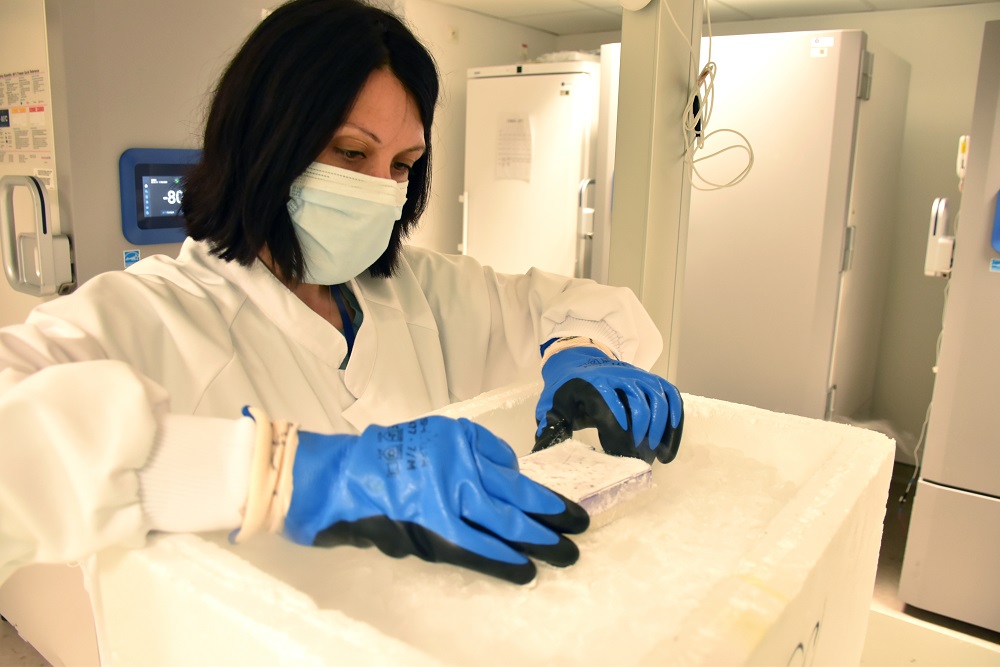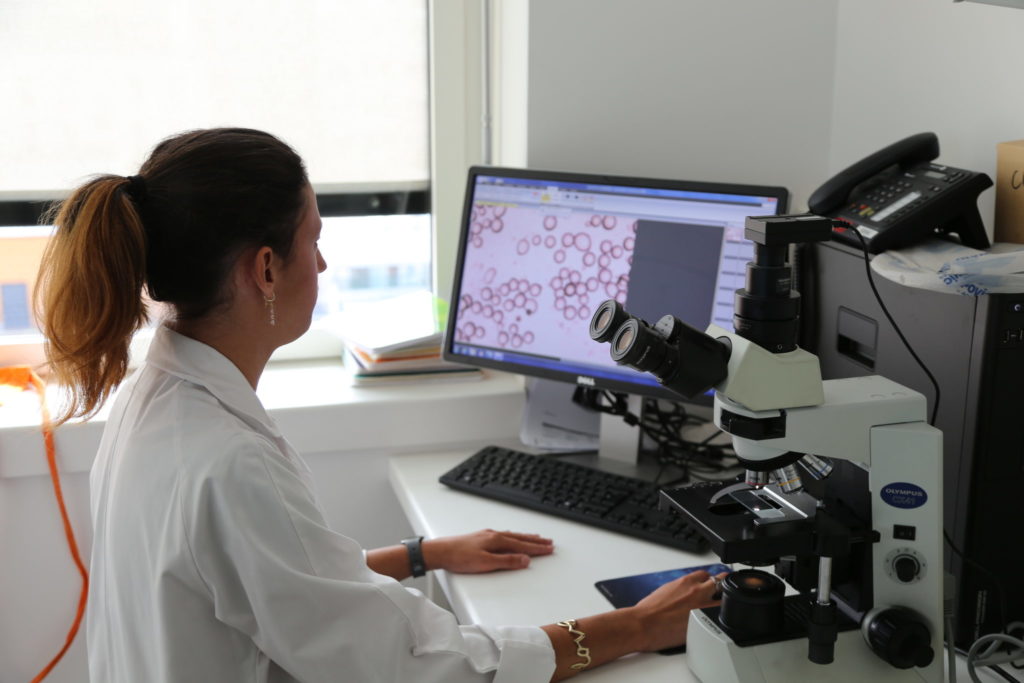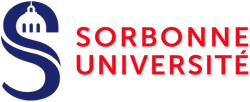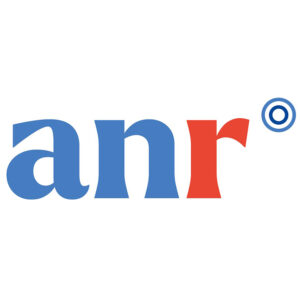The ICAN BioCollection Biological Resource Centre (BRC)

The ICAN BioCollection BRC (formerly known as Bio ICAN) integrates collection/reception, sample processing (centrifugation, aliquoting, DNA and RNA extraction, etc.), storage at -20°C, -80°C and -150°C with temperature monitoring and the provision of biological resources. Several types of biological samples are stored at ICAN BioCollection: serum, plasma, buffy coat, adipose tissue (subcutaneous, mesenteric, omental), liver tissue, urine, faeces, saliva, etc
New sample treatments can be set up at the user’s request.
Our services
Opening hours: 8.30am – 4.30pm, Monday to Friday
Sample management
- Preparation of sampling kits
- Receipt of samples
- Sample management: serum, plasma, PBMC, extraction of circulating and cellular DNA and RNA, urine
- Aliquotage of faeces
- Non-invasive labelling of samples (using QR-code tubes)
- Inventory
Return of biological samples
- Preparation of samples for dispatch
- Organisation of transport
Storage of biological samples
- Variable storage temperature depending on the type of biological resource
- Temperature monitoring report with 24/7 alert system
- Collection duplication: mirror bank on another storage site
- Storage capacity: 1 million samples
- On-call system operational on Saturdays, Sundays and public holidays from 8am to 9pm
Legal authorisations
- The bank declared its activity to the Ministry of Research under no. DC 2022-5151 on 29/09/2023.
- The bank has declared compliance with MR004 (2204190 v 0).

Conditions of collaboration
As part of its collaboration, the CRB has drawn up a Charter to govern the relationship between ICAN BioCollection and its Interested Parties, in compliance with the ethical principles governing the collection of elements and products of the human body and their derivatives, the legislative and regulatory provisions governing the collection, processing and storage of the said products, and the information associated with them.
In order to optimise the use of the Collections and samples currently deposited and which will be deposited in the future, ICAN BioCollection has drawn up this charter, the terms of which will be binding on all persons accessing ICAN BioCollection services.
Key figures
Samples received each year
Samples banked each year
Samples made available each year
Contacts
Estelle MOGENSEN
Operational manager
Bât E3M – 6th floor
47-48 bd de l’hôpital
75013 Paris ICAN
Our catalogue of collections
This table shows the biological sample collections available.
If you are interested in our biological resource collections, or in setting up a biological resource collection at the BRC, you can contact the BRC directly or fill in our request form and send it back to us by e-mail at CRB.bio-ican@ihuican.org.
collection
Approach
pathology
Acute Coronary Syndrome
sample(s)
Serum, plasma, DNA, urine, stool
Responsible
Prof. Johanne SILVAIN
started in
2015
Abstract
Acute Coronary Syndrome (ACS) is the obstruction of one or more coronary arteries. The aim of this study is to better understand the aetiology and pathophysiology of acute coronary syndrome. The APPROACH collection was created in 2015 by Pr. Johanne SILVAIN PU-PH within the Cardiology Department of the Pitié Salpêtrière – Charles Foix University Hospitals, and consists of serum, plasma, urine, stool and DNA samples with numerous associated clinical data.
collection
Myocardium
pathology
Heart failure / cardiomyopathy
sample(s)
Serum, plasma, DNA, urine, faeces
Responsible
Prof. Richard ISNARD
started in
2015
Summary
The aim of this study is to monitor patients suffering from heart failure syndrome or cardiomyopathy (CMD). The syndrome is heterogeneous and one of the aims of this project is to identify or validate new diagnostic and prognostic biomarkers. The MYOCARD collection was created in 2015 by Pr. Philippe Charron PU-PH within the Cardiology Department of the Pitié Salpêtrière – Charles Foix University Hospitals, and consists of serum, plasma, urine, stool and DNA samples with extensive associated clinical data.
collection
iPS-CARDIOGEN
pathology
Inherited cardiac diseases (cardiomyopathies/electrical diseases)/inherited vascular diseases
sample(s)
Serum, DNA, PBMC, Skin fibroblasts
Responsible
Prof. Philippe CHARRON
started in
2015
Summary
The mechanisms associated with human hereditary heart and vascular diseases remain largely unknown. The aim of the iPS-CARDIOGEN study is to develop new experimental models for studying hereditary heart and vascular diseases. The iPS-CARDIOGEN collection was created in 2015 by Prof. Philippe Charron, PU-PH at the Reference Centre for Cardiac Diseases at the Pitié Salpêtrière – Charles Foix University Hospitals, and consists of serum and DNA samples with extensive associated clinical data. To find out more, click here.
collection
FIFA/EPOS/LITMUS
pathology
Metabolic steatosis of the liver
sample(s)
Blood, plasma, urine, liver biopsy
Responsible
Prof. Vlad RATZIU
started in
2015
Summary
Metabolic steatosis of the liver is a chronic liver disease associated with the presence of one or more metabolic risk factors or sleep apnoea syndrome, in the absence of another cause of chronic liver disease. Metabolic steatosis can progress to liver fibrosis and cirrhosis. The main research areas of the study linked to the collection are understanding the pathophysiology of metabolic steatosis of the liver and developing diagnostic tools. The FIFA-EPOS collection was created in 2015 by Prof. Vlad Ratziu, PU-PH in the Hepato-gastroenterology Department of the Pitié Salpêtrière – Charles Foix University Hospitals, and consists of serum and DNA samples with extensive associated clinical data. Link to the relevant study:
collection
FH-CALC
pathology
Autosomal dominant heterozygous familial hypercholesterolemia
sample(s)
Serum, Plasma, Stool
Responsible
Dr. Antonio Gallo
started in
2018
Abstract
Familial hypercholesterolaemia is an inherited metabolic disorder characterised by elevated levels of LDL cholesterol in the blood. The main areas of research in the FH-CALC study are understanding the pathophysiology of familial hypercholesterolaemia and developing diagnostic tools. The FH-CALC collection was created in 2018 by Dr. Antonio Gallo, Associate Practitioner, Internist at the Cardiovascular Disease Prevention Unit of the Cardiology and Metabolism Pole of the Pitié Salpêtrière – Charles Foix University Hospitals and is made up of serum, plasma and stool samples. Numerous clinical data are associated with the samples.
collection
CORO-NASH
pathology
Metabolic steatosis of the liver/cardiovascular diseases
sample(s)
DNA, serum, stool, liver biopsy
Responsible
Dr. Raluca Pais
started in
2018
Abstract
The relationship between metabolic liver steatosis (NAFLD), metabolic liver steatohepatitis (NASH) and atherosclerotic coronary artery disease (ASCAD) is now recognised due to shared cardiometabolic risk factors (MRFs), the likely role of NAFLD/NASH in the occurrence of pre-atherosclerotic lesions and myocardial dysfunction associated with NAFLD/NASH.The aim of this study is to determine the prevalence of NAFLD/NASH in patients admitted to cardiology for suspected coronary artery disease.The CORO-NASH collection was created in 2019 by Dr. Raluca Pais within the Service d’hépato-gastro-entérologie des Hôpitaux Universitaires Pitié Salpêtrière – Charles Foix, and consists of DNA, serum, stool, liver biopsy samples with numerous associated clinical data.
collection
Obeco
pathology
Obesity
sample(s)
Serum
Responsible
Prof. Anne Bachelot
started in
2018
Summary
The efficacy of oral contraceptives depends on the blood levels of these drugs after digestive absorption and their distribution in the body. Obesity surgery with malabsorption (gastric bypass) can theoretically alter the biological availability of drugs in obese patients. The aim of this study is to assess the pharmacokinetics of oral contraceptives in obese women before and after bariatric surgery. The OBECO collection was created in 2015 by Prof. Anne Bachelot, Pu-PH in the Endocrinology and Reproductive Medicine Department of the Pitié Salpêtrière – Charles Foix University Hospitals, and is made up of serum samples with numerous clinical data associated with the samples.
collection
CARDIO-MET
pathology
Familial hypercholesterolaemia
sample(s)
Serum, plasma
Responsible
Prof. Eric BRUCKERT
started in
2021
Summary
The crucial role of dyslipidaemia, in particular hypercholesterolaemia, in the development of cardiovascular disease is particularly well documented. Familial hypercholesterolaemia (FH) is a genetic disease characterised by high plasma concentrations of LDLC. Triglyceride-rich lipoproteins (TRL) contribute to the progression of cardiovascular disease. The aim of this study is to compare the apolipoprotein profile of patients with HF by comparing those with associated hyperTG with those with isolated hypercholesterolaemia. The CARDIO-MET collection was created in 2021 by Pr Eric BRUCKERT within the Endocrinology and Metabolism Department of the Pitié Salpêtrière – Charles Foix University Hospitals, and consists of serum and plasma samples with associated clinical data.
collection
IMPULSMACS
pathology
Heart failure
sample(s)
Serum, DNA, circulating RNA, PBMC
Responsible
Dr Guillaume Lebreton
started in
2021
Summary
Implantation of LVADs (Left Ventricular Assist Devices) is a medium to long-term therapeutic option for patients with end-stage heart failure and isolated left ventricular dysfunction. However, their use remains limited by the frequency of their adverse effects, most of which are unpredictable. Several factors, including pulsatility, have been associated with LVAD complications in the literature, particularly haemorrhagic complications. However, the pathophysiological pathways associated with reduced pulsatility are poorly understood. The aim of the prospective follow-up of patients included in this study is to investigate the pathophysiological pathways associated with reduced pulsatility and leading to LVAD complications. The IMPULSMACS collection was created in 2021 by Dr Guillaume Lebreton within the Cardiac Surgery Department of the Pitié Salpêtrière – Charles Foix University Hospitals, and consists of serum, DNA, circulating RNA and PBMC samples with associated clinical data. Link to the study concerned.
Rates for services
| Services | ICAN/SU (€/unit) | Academic (excluding SU) & Industry |
|---|---|---|
| Receipt of sample tubes | ||
| Reception | 7 € | CRI grid |
| Freezing (without technic) | ||
| Tube | 1 € | CRI grid |
| Technicage | ||
| Serum/plasma preparation 2D tube | 2,30 € | CRI grid |
| Serum/plasma preparation 2ml tube | 2,30 € | CRI grid |
| Stool Aliquot | 2,50 € | CRI grid |
| Tissue preparation for inclusion | 2,50 € | CRI grid |
| DNA extraction from blood | 33 € | CRI grid |
| RNA extraction from soft tissue (except adipose tissue) | 35 € | CRI grid |
| Plasma/serum RNA extraction | 28 € | CRI grid |
| Adipocyte sizing | 18 € | CRI grid |
| Non-technical HR time (€/h) | 28 € | CRI grid |
| Step freezing | 8 € | CRI grid |
| PBMC preparation | 30 € | CRI grid |
| Cell count and viability | 7 € | CRI grid |
| Freezing viable cells | 9 € | CRI grid |
| Storage | ||
| 2D tube -80 °C | 0,05 € | CRI grid |
| 2ml tube -80 °C | 0,08 € | CRI grid |
| 5ml tube -80 °C | 0,34 € | CRI grid |
| Tube 12ml-15ml -80 °C | 0,60 € | CRI grid |
| 2ml tube – 150 °C | 1,05 € | CRI grid |
| Clearance | ||
| Tube | 1 € | CRI price list |
Click here to consult the national price list for certified hospital CRBs and tumour banks drawn up by the Research and Innovation Commission (CRI) of the Conférence des directeurs généraux de CHU.
The processing of your personal data complies with the provisions of the CNIL (French Data Protection Act) and the General Data Protection Regulation. To exercise your rights regarding the processing of your personal data: mesdonnees@ican-institute.org.








